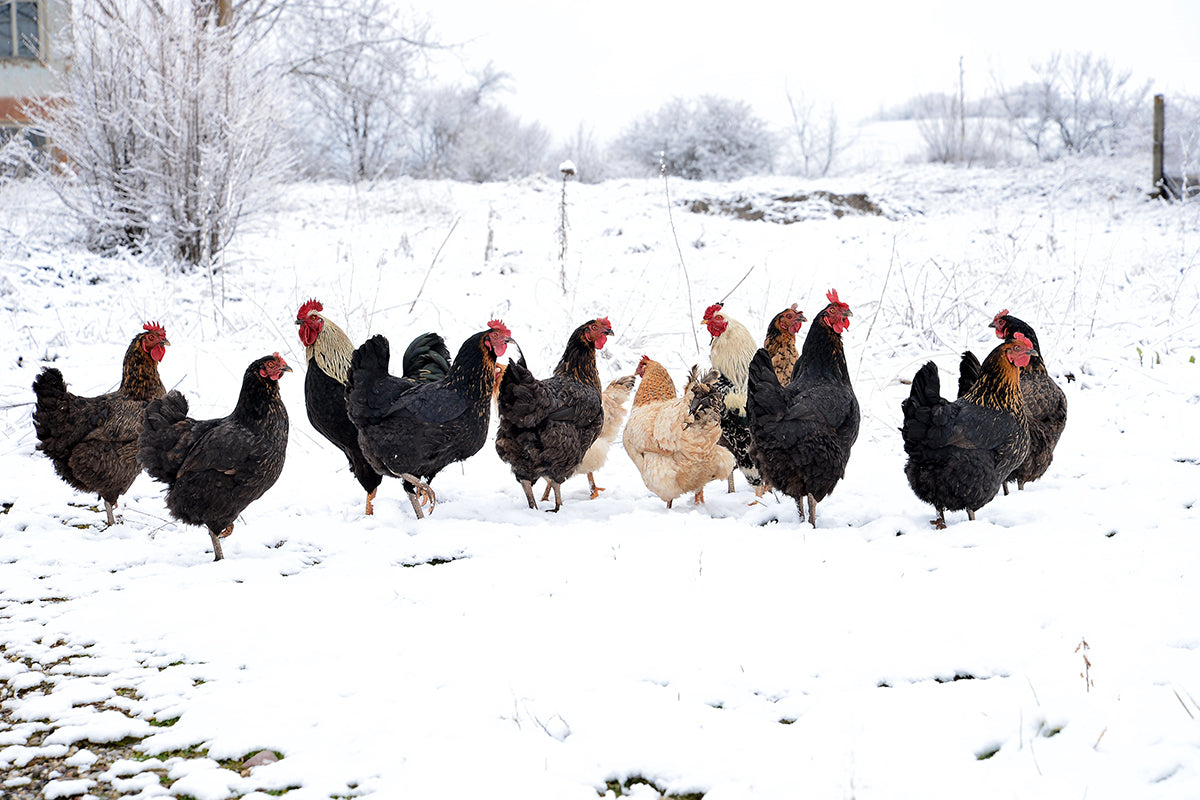
How to Keep Chickens Warm at Night
Chickens are hardy animals and can thrive at night, even during colder seasons. They instinctively know when to go inside and seek warmth and how to brave those more frigid, chilly evenings. But even with all their impressive survival skills, they still need a little help from their caretakers when the temperature drops at night in the winter.

Feed Your Chickens a Little Extra at Night
Chickens naturally eat more feed in the winter since they need more energy to stay warm, and there's less grass and bugs outside to snack on. Try giving your chickens some extra cracked corn in the evenings so their full bellies will help keep them warmer after the sun goes down.
Provide Good Ventilation and Insulation
Chickens are hardy, and their feathers keep them nice and toasty. In some situations, they may not need extra heating if you have good insulation that protects the coop from cold drafts. But you will need to cover any drafty holes in your coop.
But while insulation is important, so is proper ventilation. A damp coop, or one with lots of ammonia in the air, is a health hazard. Vents are best placed near the coop's roof, where the cold air won't hit your chickens directly.
Give Them Places to Roost Away from the Cold Ground
Chickens instinctively go indoors to their coop when it's too cold outside. And once the sun goes down, they naturally roost in groups away from the cold ground, fluffing their feathers to stay warm. Their feathers help keep warm air near their body while insulating them from the cold.
You can encourage this natural behavior by setting up roosts at least two to three feet off the ground. And make sure there's enough roosting space for everyone. A good roosting setup helps them keep their feet warm. Chickens tend to lose body heat through their unfeathered parts, like their feet. A great option for winter roosting is the K&H Thermo-Chicken Perch. It provides gentle warmth for chilly toes. Plus, it's ergonomically designed just for chickens.
Use Heating Products Designed for Chickens
Space heaters made for humans and heating lamps don't mix well with chicken coops. They can be a big fire hazard with all the hay and bedding used in a coop. If you do use a heating source, it's super important you make sure it's designed especially for chickens, and it's UL or MET safety listed. All K&H heated chicken products, for example, are MET safety listed.
If your chickens need a little extra heat in their coop, try the K&H Thermo-Chicken Heated Pad, which is designed to keep chickens of all ages warm in the winter. It's energy efficient — using only 40 watts — and can be used on the floor or mounted to a wall. There's also a K&H Thermo-Peep Heated Pad designed for baby chicks.
Good Bedding Helps Chickens Stay Warm
Good bedding can go a long way in helping your chickens stay warm. Some chicken caretakers use the deep litter method, which means they allow bedding and poop to build up in the spring and summer, creating a composting effect that generates natural heat in the winter. However, this method can be a health hazard if it's not managed properly. For example, the composting isn't working right if you can smell ammonia.
That's why some chicken owners opt for simpler bedding methods, like replacing used bedding in the winter with deep levels of fresh, warm bedding materials that are also insulating. Consider bedding like wood shavings, shredded paper, straw or ground corn cobs. If you go this route, you need to check the bedding's moisture levels frequently and clean the bedding regularly.
Protect Against Frostbite
Frostbite can be a real concern when the temperatures drop at night — even your hardy hens need a little help. Try putting some petroleum jelly on their combs and wattles to help prevent frostbite.
Make Sure the Water Doesn't Get Icy
You'll also need to monitor your chickens' water as it gets colder to ensure it doesn't freeze. Icy water can negate all the hard work you put into keeping your chickens warm.
The heated version of the K&H Poultry Waterer is a great way to keep your chickens' water from freezing. This chicken waterer features a no-rust 2.5-gallon BPA-free tank that chickens are unable to roost upon. The unique, easy-to-remove filter tray allows you to clean the water tray in seconds.
If you already have a water tank that isn't heated, try the K&H Universal Waterer Deicer. It can be used with any aluminum or plastic waterer and has a sealed bottom to keep unwanted pests from nesting.
Warm Their Bodies with Exercise
As it gets colder, chickens can also generate some much-needed body heat through exercise. An easy method to use if it's too snowy to go outside is hanging cabbage heads for them to peck on. The snack is tasty, healthy and can warm their bellies through a long winter's night.
Your Chickens Are Resilient
Chickens are hardy, feathered warriors that can stay healthy and strong as the temperature drops. As their caretaker, you can give them a helping hand by keeping their water warm, feeding them at night and providing a good chicken coop that's warm and free from drafts. With these extra steps, your chickens will stay nice and toasty when the night chill sets in.


